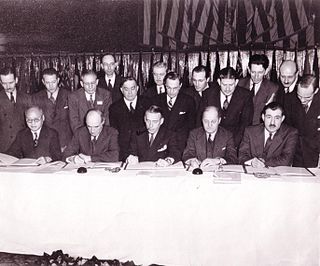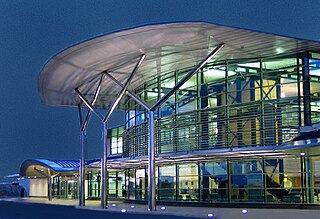Related Research Articles

The International Civil Aviation Organization is a specialized agency of the United Nations that coordinates the principles and techniques of international air navigation, and fosters the planning and development of international air transport to ensure safe and orderly growth. The ICAO headquarters are located in the Quartier International of Montreal, Quebec, Canada.

The Crown Dependencies are three island territories in the British Islands that are self-governing possessions of the British Crown: the Bailiwick of Guernsey and the Bailiwick of Jersey, both located in the English Channel and together known as the Channel Islands, and the Isle of Man in the Irish Sea between Great Britain and Ireland. They are not part of the United Kingdom (UK) nor are they British Overseas Territories. They have the status of "territories for which the United Kingdom is responsible", rather than sovereign states. As a result, they are not member states of the Commonwealth of Nations. However, they do have relationships with the Commonwealth and other international organizations, and are members of the British–Irish Council. They have their own teams in the Commonwealth Games.

The Bailiwick of Guernsey is a self-governing British Crown Dependency off the coast of Normandy, France, comprising several of the Channel Islands. It has a total land area of 78 square kilometres (30 sq mi) and an estimated total population of 67,334.

A private pilot licence (PPL) or private pilot certificate is a type of pilot licence that allows the holder to act as pilot in command of an aircraft privately. The basic licence requirements are determined by the International Civil Aviation Organization (ICAO), but implementation varies from country to country. According to ICAO, an applicant must be at least 17 years old, demonstrate appropriate knowledge and skill, and hold at least a Class 2 medical certificate. Different PPLs are available for different categories of aircraft, such as aeroplane, helicopter, airship, etc, and are not interchangeable, although experience from a PPL in one category may be credited towards the issue of another.

The Convention on International Civil Aviation, also known as the Chicago Convention, established the International Civil Aviation Organization (ICAO), a specialized agency of the United Nations charged with coordinating international air travel. The Convention establishes rules of airspace, aircraft registration and safety, security, and sustainability, and details the rights of the signatories in relation to air travel. The Convention also contains provisions pertaining to taxation.

Guernsey Airport is an international airport on the island of Guernsey and the largest airport in the Bailiwick of Guernsey. It is located in the Forest, a parish in Guernsey, 2.5 nautical miles southwest of St. Peter Port and features mostly flights to Great Britain and some other European destinations.
Pilot licensing or certification refers to permits for operating aircraft. Flight crew licences are issued by the civil aviation authority of each country, which must establish that the holder has met minimum knowledge and experience before issuing licences. The licence, along with the required class or type rating, allows a pilot to fly aircraft registered in the licence issuing state.

A type certificate signifies the airworthiness of a particular category of aircraft, according to its manufacturing design. Certification confirms that the aircraft of a new type intended for serial production is in compliance with applicable airworthiness requirements established by the national air law.

An aircraft registration is a code unique to a single aircraft, required by international convention to be marked on the exterior of every civil aircraft. The registration indicates the aircraft's country of registration, and functions much like an automobile license plate or a ship registration. This code must also appear in its Certificate of Registration, issued by the relevant civil aviation authority (CAA). An aircraft can only have one registration, in one jurisdiction, though it is changeable over the life of the aircraft.
Aviation law is the branch of law that concerns flight, air travel, and associated legal and business concerns. Some of its area of concern overlaps that of admiralty law and, in many cases, aviation law is considered a matter of international law due to the nature of air travel. However, the business aspects of airlines and their regulation also fall under aviation law. In the international realm, the International Civil Aviation Organization (ICAO) provides general rules and mediates international concerns to an extent regarding aviation law. The ICAO is a specialized agency of the United Nations.

The Royal Bank of Scotland International, trading under the NatWest International (retail), RBS International (institutional), Coutts Crown Dependencies and Isle of Man Bank brands, is the offshore banking arm of NatWest Group. It provides a range of services to personal, business, commercial, corporate and financial intermediary customers from its base in St. Helier, Jersey.

A type rating is an authorization entered on or associated with a pilot license and forming part thereof, stating the pilot's privileges or limitations pertaining to certain aircraft type. Such qualification requires additional training beyond the scope of the initial license and aircraft class training.

Civil aviation is one of two major categories of flying, representing all non-military and non-state aviation, both private and commercial. Most countries in the world are members of the International Civil Aviation Organization and work together to establish common Standards and Recommended Practices for civil aviation through that agency.

The Directorate General of Civil Aviation (DGCA) is a statutory body of the Government of India to regulate civil aviation in India. It became a statutory body under the Aircraft (Amendment) Act, 2020. The DGCA investigates aviation accidents and incidents, maintains all regulations related to aviation and is responsible for issuance of licenses pertaining to aviation like PPL's, SPL's and CPL's in India. It is headquartered along Sri Aurobindo Marg, opposite Safdarjung Airport, in New Delhi. The Government of India is planning to replace the organisation with a Civil Aviation Authority (CAA), modelled on the lines of the American Federal Aviation Administration (FAA).
The Convention on Offences and Certain Other Acts Committed on Board Aircraft, commonly called the Tokyo Convention, is an international treaty concluded at Tokyo on 14 September 1963. It entered into force on 4 December 1969, and as of 2022 has been ratified by 187 parties.
The General Civil Aviation Authority (GCAA) is the civil aviation authority of the United Arab Emirates (UAE). Its head office is in Al Rawdah, Abu Dhabi.

The Law of Guernsey originates in Norman customary law, overlaid with principles taken from English common law and French law, as well as from statute law enacted by the competent legislature(s) – usually, but not always, the States of Guernsey.

Waves was an airline based in Guernsey in the Channel Islands and a subsidiary of Waves Technologies Limited, a privately owned company. It planned to operate from its hub at Guernsey Airport to up to 15 regional airports in and around the Channel Islands. Waves also planned to undertake cargo and medevac activities, on demand.
The Office of the Director of Civil Aviation (ODCA) is the civil aviation authority of the Bailiwick of Guernsey and Bailiwick of Jersey. It is run by the Director of Civil Aviation.
References
- ↑ "OFFICE OF THE DIRECTOR OF CIVIL AVIATION CHANNEL ISLANDS" . Retrieved 5 July 2023.
- ↑ "Convention on International Civil Aviation (ICAO Convention)" . Retrieved 4 July 2023.
- ↑ "State Safety Programme for the Bailiwick of Guernsey". 1 September 2013.
- ↑ "Guernsey launches aviation registry" (PDF). December 2023.
- ↑ "2-REG changes allow commercial air transport registration". 3 March 2016.
- ↑ "AIRCRAFT REGISTRIATION – ELIGIBILITY AND ADMISSION CRITERIA" . Retrieved 4 July 2023.
- ↑ "The principle and benefits of multiple Type Certificates" . Retrieved 5 July 2023.
- ↑ "Guernsey Aircraft Registry ("2-REG") Guide to Transitional Registrations" . Retrieved 4 July 2023.
- ↑ "2-REG success". 31 August 2023.
- ↑ "Aircraft register - Bailiwick of Guernsey" (PDF). 1 July 2023.
- ↑ "Larger aircraft made a success of 2-Reg ..." 2 September 2022.